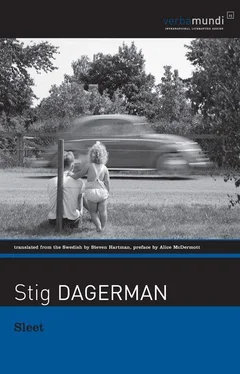Sometimes he takes his schoolbooks out of the little sugar crate under the window and sits down on the floor in the middle of the room to look through them. It’s a stupid and pointless exercise, a way of punishing himself. Yet he does it all the same with a kind of merciless gloating, as if he were his own worst enemy. Poor kids often have old schoolbooks their parents have picked up at used bookstores, scarred with the marks and stains of others before them. On the front page just inside the cover the name of the book’s original owner can usually be found sketched out in bold block letters impossible to rub away. Poor kids write their names under this first one in weak lead letters that are easy to erase, so their mothers can get a better price when they sell the books back at the end of the school year. His books are filled with marks and notes from a string of previous owners, and he sometimes thinks that this is why he failed. It’s not alright for poor kids to fail, partly because of the shame and partly because of the cost. On some of these hot stupid June mornings, just before he packs off to the post office, he stands there in the middle of the room flipping painfully through his old schoolbooks. Then he carefully sets them back in their little crate, as if he’d broken some taboo. And maybe he has. They are no longer his. They are forfeit. Each and every book will be sold back again in August, just before the start of the new school year.
The morning of Midsummer’s Eve begins like any other day: it is hot and he is sluggish, his bag heavy with bulk mail. The streets smell faintly of birch bloom and gasoline. His skin prickles in the sun. The bells begin to chime at the Stockholm Community Center. On the corner of Götgatan and Folkungagatan, his English teacher comes bounding up to the street from the subway, whistling, a leather briefcase swinging from his hand. This is a teacher who inspires fear, always whistling right before he pounces. He sees Håkan and greets him with the kind of forced cheer with which teachers always meet their students during vacations. Håkan is lugging too much bulk mail to shake the teacher’s hand.
“Well, Mr. Bergström,” the teacher says. “Highly commendable — your taking a job during the summer break!”
“It’s not a break,” Håkan answers. “I’m done with school.”
The teacher gets embarrassed then, as if he’d mistaken Håkan for someone else, and hustles along on his way, still whistling. To be a schoolboy and a mail carrier is commendable. But to be just a mail carrier, and nothing more, that’s another story. No one will sing his praises for that. If he gets stuck between floors in an elevator, he’ll likely be chided for not having taken the stairs in the first place. If he delivers a bent-up letter, the disgruntled recipient will probably open the door and yell down the stairwell that it’s the goddamned carrier’s fault. If he rings a doorbell because an envelope can’t fit through the mail slot, he’ll get an earful for making someone get up out of her sick bed, as if he should have known she was sick to begin with. If he forces an oversized envelope in through the slot the next time round, the very same person, now well again, may be outraged over possible damage to the parcel’s valuable contents.
For seasoned mail carriers, buildings become familiar as they do for no one else. Every building has its own distinct smell, whether pleasing or repugnant. There are proud buildings, like those on Folkungagatan, redolent of dining rooms and dusty carpets, and there are those like the ones on Södermannagatan that are honest and clean, if poor, exuding the sour aroma of mop and scouring brush. And then there are friendless, poorly-lit buildings that reek of squalor and poverty, like the ones on Kocksgatan. There are also buildings where invisible shadows linger in the stairwells and vestibules, where throats seem to close in on themselves as soon as those spaces are entered. On Folkungagatan, for instance, there is a building where a man was trapped inside during a fire and burned to death, and on Södermannagatan there is a particular doorway Håkan always hurries past apprehensively because a double murder occurred there. On the top floor of a building on Kocksgatan a young couple were asphyxiated by the gas stove. It happened so recently that he still has to deliver mail for them that arrives now and then from Norway. A picture postcard of Oslo Harbor came in the beginning of June, and even though it was in Norwegian he could make out the message: “We’re waiting to hear from you!” Then in the middle of June another card came: “Congratulations on your thirtieth birthday! We do so hope to get a letter from you soon!”
And now on Midsummer’s Eve day, during his second round of deliveries, another thick letter has arrived for them. He stands outside their door holding the letter in his hand, warming it for a long moment, before he lets it fall through the mail slot. He imagines writing a response to the return address in uncertain Norwegian: “Dear Unknown Friends: A letter carrier in the third district of Stockholm regrets to inform you that …”
But nothing comes of it. Nothing ever comes of anything. During his second round he is tired. The soles of his feet burn as though he’s been walking on hot stones and he keeps getting a cramp in his side in those buildings without elevators. A mushroom distributor on his route takes a whole armful of magazines off his hands. There’s only one building on Kocksgatan that smells nice, the one with the specialty store that deals in tropical lumber. Must be all that good foreign wood, he imagines. Today the store receives small oblong envelopes with hard contents. He once delivered a heavy packet there all the way from India. Wouldn’t it be great, he muses, if someday he had to deliver a palm tree there? He pictures a really big palm tree with coconuts hanging from the top and imagines all the letter carriers from Stockholm 4 coming along to help him carry it there. He would be the one to go in and knock on the office door, since it’s his route. Excuse me , he would say, a big package has come for you. A really big package. We’ve left it out on the sidewalk .
During the break between the second and third rounds of the day Håkan stops back home, where his father is sitting in the hot kitchen, shirt unbuttoned, drinking vodka with a couple of his co-workers. Håkan has removed the postal armband and stuffed it into his pocket because he doesn’t want to draw attention to his failure. But somehow it seems to show on him anyway, because all of a sudden his father says: “After five years of the best schooling Stockholm’s got to offer, you can bet your sweet ass Håkan’s more than qualified to lug people’s letters around town.” Håkan’s mother gets up then from the stool near the sink where she has been sitting by herself, listening, just listening. She leaves the kitchen, biting down on her lip as if to stifle an outburst.
Håkan himself goes into his little room and stands at the window. The sky is mostly clear and blue. Three white clouds drift in over the back lots of Södermalm, riding high in the sky like fugitive summer balloons. A woman is pulling laundry from a clothesline. Another is setting out potted plants in hopeful anticipation of rain. A man just across the way, in rare Midsummer form, whacks his wife on the fingers as they beat a rug together. Someone opens a window, and a gramophone starts to sing to the accompaniment of the drunken carpet-beater. Håkan’s mother enters the room behind him, but he doesn’t turn around. She sets a tray of food on his little table and goes out again. From somewhere in one of the other buildings, a baby begins to wail in a loud red tone that infiltrates every quarter in the chain of apartment houses. Down in one of the courtyards a street musician is playing the accordion, looking up at the apartments’ back windows with hopeful eyes, but the buildings are vacant as they can be only at Midsummer, and just a single penny clatters down on the cobblestones at his feet.
Читать дальше












